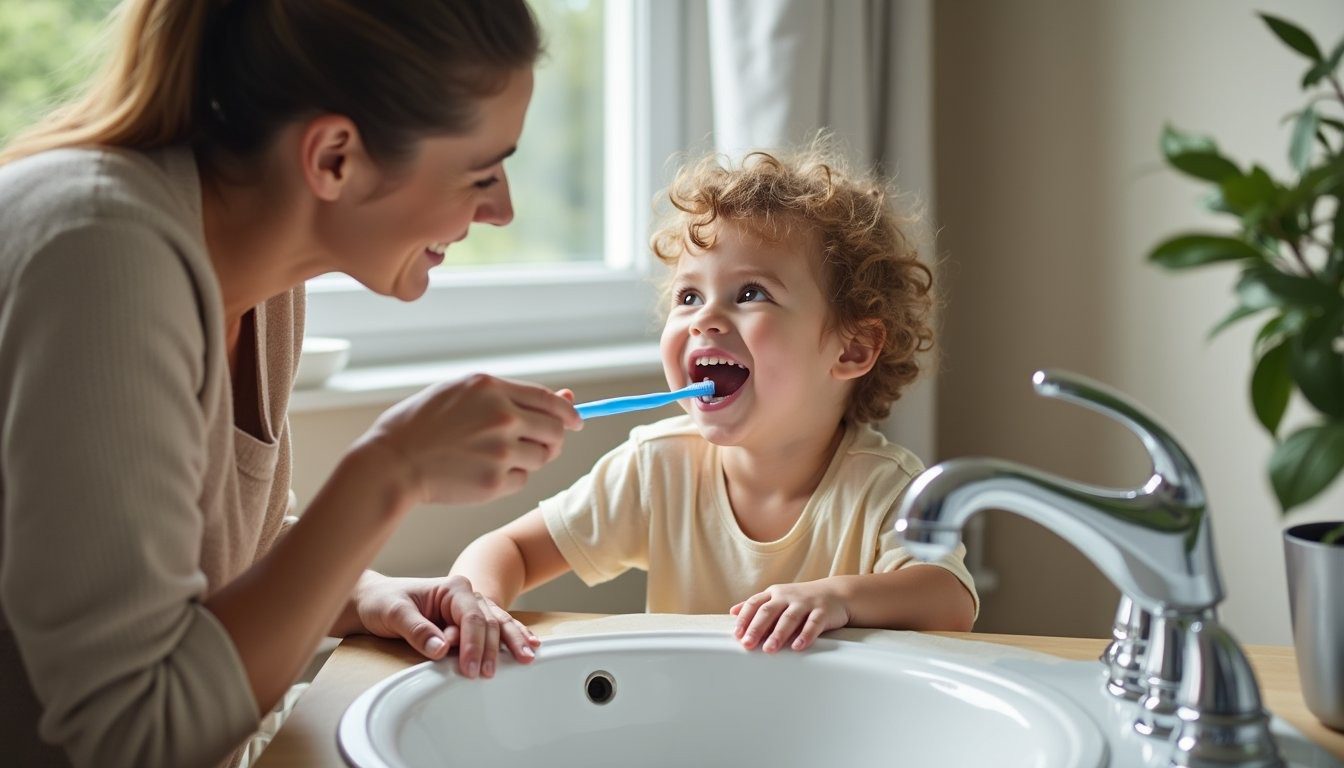
What Is the 2 2 2 Rule in Dentistry?
The 2-2-2 rule in dentistry is a simple yet effective guideline for maintaining your oral health. It suggests that you visit the dentist twice a year, brush and floss twice daily, and spend two minutes on each brushing and flossing session. By following this rule, you can greatly lower your risk of dental problems. But how exactly does this approach influence your overall health and the health of your children?
Understanding the 2-2-2 Rule
The 2-2-2 rule is a straightforward guideline that can greatly enhance your oral health. This rule emphasizes visiting the dentist twice a year, brushing and flossing your teeth twice daily, and dedicating two minutes to each session. By following this simple framework, you can establish effective dental habits that notably reduce the risk of tooth decay and gum disease. Regular dental visits allow your dentist to monitor your oral hygiene and catch potential issues early on. Additionally, instilling these habits in children can promote lifelong oral health. Remember, consistency is key; integrating the 2-2-2 rule into your routine not only supports your immediate dental well-being but also contributes to long-term health benefits.
Brushing Techniques for Effective Oral Care
Establishing effective brushing techniques is essential for maintaining oral health. Start by selecting a toothbrush with soft bristles that comfortably fits your mouth. Hold the toothbrush at a 45-degree angle against your gums to guarantee proper plaque removal. Use short, tooth-wide strokes to clean all surfaces of your teeth: the outer, inner, and chewing areas. For the inside surfaces of your front teeth, tilt the brush vertically. Remember to apply gentle pressure—brushing too hard can damage your gums and enamel. Each session should last two minutes, and you should brush twice a day to achieve the best results. Replace your toothbrush every three to four months or sooner if bristles are worn to maintain effectiveness.
The Importance of Flossing
While brushing your teeth is essential for maintaining oral hygiene, neglecting to floss can leave significant gaps in your dental care routine. Flossing benefits extend beyond just cleaner teeth; it’s linked to longer life and reduced risks of serious health issues like strokes and cardiovascular diseases. Many people hold flossing misconceptions, believing that brushing alone suffices. However, brushing removes only 40% to 60% of plaque, while flossing targets those hard-to-reach areas between your teeth, preventing gum disease and cavities. Regular flossing leads to less gum bleeding and inflammation, promoting overall oral health. Despite awareness of these benefits, only about 31.6% of adults floss daily. Make flossing a priority to guarantee a healthier smile and improved long-term health.
Regular Dentist Visits and Their Benefits
Regular dental visits, ideally every six months, play an essential role in maintaining your oral health and overall well-being. These dental checkups enable dentists to detect issues like cavities, gum disease, and even oral cancer early on, improving treatment success rates. Preventive dentistry measures, such as professional cleanings and fluoride applications, help maintain oral hygiene by removing plaque and strengthening enamel, thereby reducing the risk of decay and complications. Additionally, regular visits can identify systemic diseases linked to oral health, such as diabetes and heart disease. By addressing problems early, you can avoid costly, extensive treatments in the future, ultimately enhancing your quality of life and long-term health. Don’t underestimate the value of these vital appointments.
Impact of the 2-2-2 Rule on Children’s Oral Health
The 2-2-2 rule—brushing teeth twice a day for two minutes and visiting the dentist twice a year—significantly influences children’s oral health. By adhering to this rule, you help reduce the risk of tooth decay, a prevalent concern among young children. Establishing a routine promotes good oral hygiene habits early on, setting the foundation for lifelong practices. Regular dental visits not only facilitate early detection of dental issues but also minimize school absenteeism due to dental problems. Additionally, maintaining good oral hygiene supports overall health, improves self-esteem, and enhances quality of life. Ultimately, the 2-2-2 rule fosters a proactive approach to dental care, ensuring your child’s smile remains bright and healthy for years to come.
Preventing Dental Issues With the 2-2-2 Rule
Adopting the 2-2-2 rule is crucial for preventing dental issues in children. By brushing twice daily for two minutes and flossing at least twice, you disrupt plaque buildup, a leading cause of tooth decay. Use a soft-bristled toothbrush and fluoride toothpaste to enhance oral hygiene. Supervise your child until they’re about seven to guarantee proper technique. Regular dental visits, ideally twice a year, help detect cavities early and provide preventive treatments like fluoride applications. Encourage limiting sugary snacks and drinks to minimize the risk of enamel erosion. By consistently following the 2-2-2 rule, you can greatly reduce the likelihood of dental problems, guaranteeing a healthier smile for your child.
Long-term Benefits of Consistent Oral Hygiene
Consistent oral hygiene practices can yield considerable long-term benefits that extend beyond just a healthy smile. By adhering to these practices, you dramatically reduce the incidence of dental caries and periodontal diseases, ensuring better long-term oral health. Regular brushing and flossing minimize plaque buildup, decreasing risks of gum inflammation and costly restorative treatments. Over time, this commitment leads to fewer missing teeth and less tooth decay as you age, preserving your natural dentition. Economically, maintaining oral hygiene cuts dental treatment costs considerably, avoiding future expenses. Additionally, good oral health contributes to overall well-being, lowering risks of systemic diseases. Ultimately, investing in consistent hygiene practices enhances your quality of life and promotes social well-being.
Educational Approaches to Encourage Adoption of the 2-2-2 Rule
Developing strong oral hygiene habits is an essential step in maintaining long-term dental health, and educational approaches can play a significant role in promoting the 2-2-2 rule. Incorporating visual aids, like infographics, can help you remember to visit the dentist twice a year and brush and floss twice daily for two minutes. Encourage parental involvement by modeling good habits and integrating nutritional education about sugar’s impact on oral health. Engage children with fun content, using songs to time brushing. Collaborate with schools for broader outreach and leverage technology integration through apps to track habits. Implement reward systems, like sticker charts, to motivate consistent practice. Community outreach events can further enhance awareness and adoption of the 2-2-2 rule.
Frequently Asked Questions
Can Adults Follow the 2-2-2 Rule Too?
Yes, you can follow the 2-2-2 rule for adult dental care. By visiting the dentist twice yearly, brushing twice daily for two minutes, and flossing regularly, you’ll enhance your oral hygiene and maintain peak health.
What Products Are Recommended for the 2-2-2 Routine?
For the 2-2-2 routine, use soft-bristled toothbrushes, fluoride toothpaste, easy-to-handle dental floss, and fluoride mouthwash options. These products guarantee effective cleaning, strengthen enamel, and promote good oral hygiene habits for lasting dental health.
How Can I Motivate My Child to Follow the 2-2-2 Rule?
To motivate your child to follow the 2-2-2 rule, create engaging reward systems and incorporate fun activities like singing while brushing. Positive reinforcement encourages good habits, making oral care enjoyable and effective for them.
What Happens if I Miss a Dental Appointment?
If you miss a dental appointment, you might face consequences like delayed care and increased health risks. To reschedule, contact your dentist promptly and consider setting reminders to avoid future missed appointments.
Is the 2-2-2 Rule Effective for Braces Wearers?
The 2-2-2 rule isn’t fully effective for braces care. You need stricter orthodontic hygiene, possibly brushing after meals and using specialized tools to maintain thorough cleaning around brackets and wires for ideal oral health.
